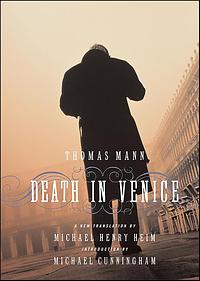You need to sign in or sign up before continuing.
Take a photo of a barcode or cover
medium-paced
This story was beautifully written and crafted. However the obsession of the elderly Aschenbach with the young boy was disturbing and baffling. The use of metaphor and symbolism served to almost make the “relationship” between the two acceptable, but I found myself repeatedly disturbed and dreading where the story would end up.
Moderate: Pedophilia
I love short stories. How the author can with so few words tell a perfect story to make us see something we didn't know existed... or did know, but weren't aware of.
Gustav is so human in his love, obsession, desire, and effort to please... thinking of him sitting in the barber chair getting "rejuvenated", seeing the youth blossom on his face... a ridiculous old man, like the old man he despised at the beginning of the story. Ridiculous, but so sad, so recognizable... I can't help but feel deep sympathy.
This story reminds me very much of Lolita, as we don't know at all what goes on in the head of the boy. We don't know if he is basking in the older man's obsession, or if he is wary of it. We only have Gustav's story of it. But contrary to Lolita, Gustav doesn't r the boy.
Gustav is so human in his love, obsession, desire, and effort to please... thinking of him sitting in the barber chair getting "rejuvenated", seeing the youth blossom on his face... a ridiculous old man, like the old man he despised at the beginning of the story. Ridiculous, but so sad, so recognizable... I can't help but feel deep sympathy.
This story reminds me very much of Lolita, as we don't know at all what goes on in the head of the boy. We don't know if he is basking in the older man's obsession, or if he is wary of it. We only have Gustav's story of it. But contrary to Lolita, Gustav doesn't r the boy.
emotional
mysterious
sad
slow-paced
Plot or Character Driven:
Character
Strong character development:
Yes
Loveable characters:
No
Diverse cast of characters:
No
Flaws of characters a main focus:
Yes
Despite how short this was, it felt much longer. I wasn't captured by it, and found the whole thing kind of silly. Maybe my opinion will change as I discuss it more. After all, I thought Turn of the Screw was tres dull last year, and really came to enjoy it the more I dissected it.
reflective
slow-paced
*shudders*
read this at the bookstore while trying to decide if I should spend a crazy amount of money on the magic mountain. by the first pages I had already made up my mind to be honest (bought it!). I don't regret it because mann's writing is gorgeous and hopefully there will be no minors on it but uh. why the hell did I choose THIS one as my first mann and why did I look up things about it because I feel a strong need to drink a little bit of bleach rn.
read this at the bookstore while trying to decide if I should spend a crazy amount of money on the magic mountain. by the first pages I had already made up my mind to be honest (bought it!). I don't regret it because mann's writing is gorgeous and hopefully there will be no minors on it but uh. why the hell did I choose THIS one as my first mann and why did I look up things about it because I feel a strong need to drink a little bit of bleach rn.
challenging
dark
mysterious
tense
slow-paced
Plot or Character Driven:
Character
Strong character development:
Yes
Loveable characters:
No
Diverse cast of characters:
No
Flaws of characters a main focus:
Yes
El libro narra la historia de Gustav Aschenbach, un escritor disciplinado e introvertido que, un día, al observar a una persona de aspecto extranjero paseando por Munich, siente el deseo de viajar y cambiar de aires. Luego de algunas travesías, Aschenbach se establece en un hotel en Lido, Venecia, donde también se hospeda una familia polaca y a sus hijos. Nuestro protagonista comienza a sentir una atracción por el hijo mayor, el joven Tadzio, cuya belleza inicialmente lo deslumbra y por quien luego desarrolla una obsesión casi irracional.
Las descripciones de Mann son increíblemente detalladas y ricas, al igual que sus diálogos internos e introspecciones. Con una prosa experta, contrapone temas como el trabajo y el deleite, la juventud y la vejez, la literatura y la estética. Al comienzo de su viaje, Aschenbach se repugna por un personaje mayor que viaja en su barco con un grupo de jóvenes, usando peluca y maquillaje para ocultar su edad. Este personaje, actúa como un presagio de lo que le espera al escritor. Su obsesión por Tadzio lo llevará poco a poco a caer en este mismo juego, llegando a usar maquillaje y tinte para el cabello para agradar al joven y a seguirlo secretamente por las callejuelas de Venecia. Todo sucede bajo la amenaza del cólera, que oficiales y locales intentan ocultar. El título nos anticipa el desenlace, y Mann nos conduce hasta a él logrando que el lector sienta una suerte de lástima por Aschenbach, aunque no apruebe sus acciones.
Investigando sobre Thomas Mann, encontré varios paralelismos entre él y Aschenbach. Se dice que Mann se inspiró en un joven polaco que conoció en Lido en 1911 para escribir esta novela, publicada en 1912. Desconozco la reacción inicial al libro, pero supongo que hoy sería visto como una apología a la pedofilia. Sin enfrascarme en ese tema, creo que mirar más allá permite descubrir un libro con una narrativa admirable y una de las obras más famosas de este Nobel de Literatura.
Las descripciones de Mann son increíblemente detalladas y ricas, al igual que sus diálogos internos e introspecciones. Con una prosa experta, contrapone temas como el trabajo y el deleite, la juventud y la vejez, la literatura y la estética. Al comienzo de su viaje, Aschenbach se repugna por un personaje mayor que viaja en su barco con un grupo de jóvenes, usando peluca y maquillaje para ocultar su edad. Este personaje, actúa como un presagio de lo que le espera al escritor. Su obsesión por Tadzio lo llevará poco a poco a caer en este mismo juego, llegando a usar maquillaje y tinte para el cabello para agradar al joven y a seguirlo secretamente por las callejuelas de Venecia. Todo sucede bajo la amenaza del cólera, que oficiales y locales intentan ocultar. El título nos anticipa el desenlace, y Mann nos conduce hasta a él logrando que el lector sienta una suerte de lástima por Aschenbach, aunque no apruebe sus acciones.
Investigando sobre Thomas Mann, encontré varios paralelismos entre él y Aschenbach. Se dice que Mann se inspiró en un joven polaco que conoció en Lido en 1911 para escribir esta novela, publicada en 1912. Desconozco la reacción inicial al libro, pero supongo que hoy sería visto como una apología a la pedofilia. Sin enfrascarme en ese tema, creo que mirar más allá permite descubrir un libro con una narrativa admirable y una de las obras más famosas de este Nobel de Literatura.





